Dihybrid inheritance - Study guides, Revision notes & Summaries
Looking for the best study guides, study notes and summaries about Dihybrid inheritance? On this page you'll find 256 study documents about Dihybrid inheritance.
Page 4 out of 256 results
Sort by
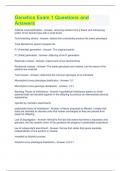
-
Genetics Exam 1 Questions and Answers
- Exam (elaborations) • 17 pages • 2023
- Available in package deal
-
- £8.53
- + learn more
Artificial cross-fertilization - Answer- removing anthers from a flower and introducing pollen of the desired type with a small brush Pure-breeding strains - Answer- strains that consistently produce the same phenotype Took Mendel two years to prepare his P1 (Parental) generation - Answer- The original parents F1 (Filial) generation - Answer- offspring of the P generation Replicate crosses - Answer- repeat each cross several times Reciprocal crosses - Answer- The same genotypes...
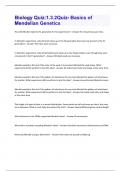
-
Biology Quiz:1.3.2Quiz- Basics of Mendelian Genetics (Questions & Answers) Rated 100% Correct!!
- Exam (elaborations) • 2 pages • 2024
- Available in package deal
-
- £6.49
- + learn more
How did Mendel make the F1 generation for his experiments? - Answer-He crossed two pure lines. In Mendel's experiment, why did traits show up in the F2 generation that were not present in the F1 generation? - Answer-The traits were recessive. In Mendel's experiment, why did wrinkled seeds show up in the F2 generation, even though they were not present in the F1 generation? - Answer-Wrinkled seeds are recessive. Mendel wanted to find out if the color of the seed of a pea plant affected the...
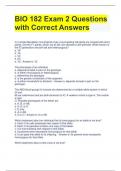
-
BIO 182 Exam 2 Questions with Correct Answers
- Exam (elaborations) • 14 pages • 2024
- Available in package deal
-
- £11.61
- + learn more
BIO 182 Exam 2 Questions with Correct Answers In a simple Mendelian monohybrid cross, true-breeding tall plants are crossed with short plants, and the F1 plants, which are all tall, are allowed to self-pollinate. What fraction of the F2 generation are both tall and heterozygous? a. 1⁄8 b. 1⁄4 c. 1⁄3 d. 2⁄3 e. 1⁄2 - Answer-e. 1⁄2 The phenotype of an individual a. depends at least in part on the genotype. b. is either homozygous or heterozygous. c. determines the genotyp...

-
Unit 11 Aim C: Genetic Inheritance Assignment (DISTINCTION)
- Essay • 12 pages • 2023
- Available in package deal
-
- £5.49
- + learn more
This is my distinction grade assignment for unit 11 aim C on genetic inheritance including dihybrid, monohybrid, epistasis and more. All criteria were met and I was awarded distinction. If you have any questions or concerns, please do not hesitate to get in touch. I hope you find my assignment helpful!
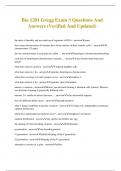
-
Bio 1201 Gregg Exam 3 Questions And Answers (Verified And Updated)
- Exam (elaborations) • 7 pages • 2024
-
- £9.34
- + learn more
Bio 1201 Gregg Exam 3 Questions And Answers (Verified And Updated) the units of heredity and are made up of segments of DNA - answergenes how many chromosomes do humans have in the nucleus of their somatic cells? - answer46 chromosomes (23 pairs) the two chromosomes in each pair are called... - answerhomologous chromosomes/homologs each pair of homologous chromosomes includes... - answerone chromosome from each parent what does meiosis result in - answer4 haploid daughter cells what doe...
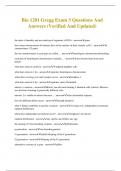
-
Bio 1201 Gregg Exam 3 Questions And Answers (Verified And Updated)
- Exam (elaborations) • 7 pages • 2024
-
- £9.34
- + learn more
Bio 1201 Gregg Exam 3 Questions And Answers (Verified And Updated) the units of heredity and are made up of segments of DNA - answergenes how many chromosomes do humans have in the nucleus of their somatic cells? - answer46 chromosomes (23 pairs) the two chromosomes in each pair are called... - answerhomologous chromosomes/homologs each pair of homologous chromosomes includes... - answerone chromosome from each parent what does meiosis result in - answer4 haploid daughter cells what doe...
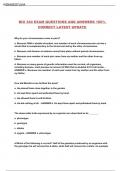
-
BIO 340 EXAM QUESTIONS AND ANSWERS 100% CORRECT LATEST UPDATE
- Exam (elaborations) • 22 pages • 2024
-
- £6.49
- + learn more
BIO 340 EXAM QUESTIONS AND ANSWERS 100% CORRECT LATEST UPDATEWhy do your chromosomes come in pairs? a. Because DNA is double-stranded, one member of each chromosome pair carries a strand that is complementary to the strand carried by the other chromosome. b. Because cell division via mitosis cannot take place without paired chromosomes. c. Because one member of each pair came from my mother and the other from my father. d. Because so many genes of genetic information must be carried, all ...
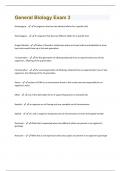
-
General Biology Exam 3 Questions & Answers Already Passed!!
- Exam (elaborations) • 5 pages • 2024
- Available in package deal
-
- £6.01
- + learn more
Homozygous - An organism that has two identical alleles for a specific trait Heterozygous - An organism that has two different alleles for a specific trait. Gregor Mendel - Father of Genetics, studied pea plants and used math and probability to show how traits would show up in the next generation F1 Generation - the first generation of offspring obtained from an experimental cross of two organisms., offspring of the p generation F2 Generation - the second generation of offspring, obtained ...
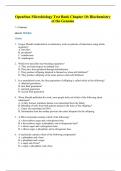
-
OpenStax Microbiology Test Bank Chapter 10: Biochemistry of the Genome
- Exam (elaborations) • 13 pages • 2024
- Available in package deal
-
- £10.16
- + learn more
OpenStax Microbiology Test Bank Chapter 10: Biochemistry of the Genome * = Correct answer Multiple Choice 1. Gregor Mendel conducted his revolutionary work on patterns of inheritance using which organism? A. fruit flies B. pea plants* C. roundworms D. snapdragons 2. Which best describes true-breeding organisms? A. They are heterozygous at multiple loci. B. They have been produced through hybridization. C. They produce offspring identical to themselves when self-fertilized.* D. The...

-
AQA A Level Biology Topic 7
- Exam (elaborations) • 9 pages • 2024
-
- £11.61
- + learn more
AQA A Level Biology Topic 7 What is a dominant allele? only one copy of it What are recessive alleles? What are codominant alleles? one is recessive Allele which is always expressed in the phenotype even when theres Alleges that only appear in the phenotype if 2 copies are present Alleles that are both expressed in the phenotype because neither If an organism carries two copies of the same allele it said to be ........ If an organism carries two different alleles it is sa...

£5.50 for your revision notes multiplied by 100 fellow students... Do the math: that's a lot of money! Don't be a thief of your own wallet and start uploading yours now. Discover all about earning on Stuvia


